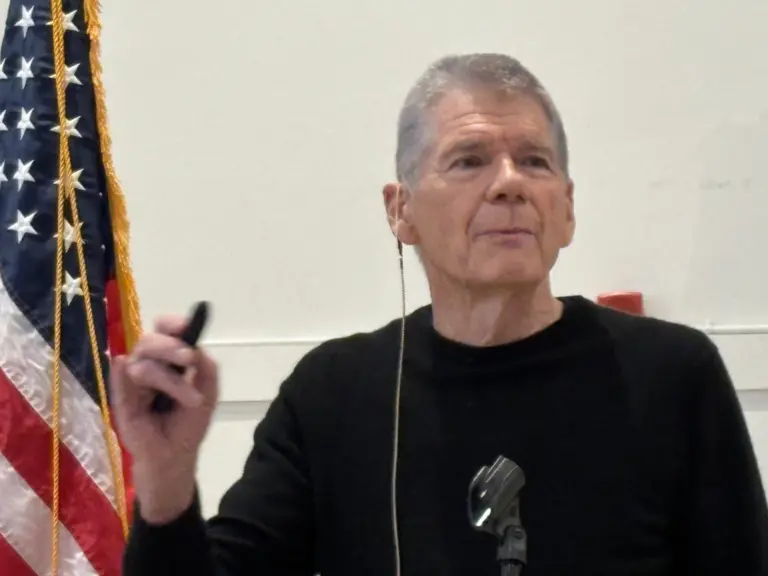By Marek Zabriskie
Few things get people more worked up than money and paying taxes, where we often face big disagreements whether it’s on the RTM or with our federal government. We have had passionate disagreements about these topics even before we became a country.
Bitter disagreements about taxes pushed the thirteen colonies in our country to fight for independence from Britain. First, there was the Stamp Act of 1765, followed by the Boston Tea Party in 1773, and the famous words, “Taxation without representation is tyranny.”
A similar dispute simmered in Jesus’ time among Jews living in first century Palestine, which was a colony of the Roman Empire ruled by Caesar. The Jews were forced to pay taxes to support the Roman army and government that occupied their country, which was ruled by Herod Antipas, one of Caesar’s appointees. His father had been the richest man in the Mediterranean.
Now, the Jews had great grievances around the question of taxation. People were divided over the question of taxation, just as they were in Colonial times here in America. Loyalists in the American colonies supported the British while patriots opposed taxation without representation. In Palestine, the Herodians supported the Roman taxes while the Pharisees bitterly opposed them.
Those who supported Herod were known as Herodians. They willingly paid taxes to Caesar. The Pharisees, however, were committed to living out each of the Jewish laws and opposed paying these taxes.
Their concern was less about paying for the Roman occupation than the means of paying it. The Romans insisted that the Jews pay their taxes using coins bearing Caesar’s image. The Pharisees saw this as a violation of the first two commandments. Caesar claimed to be God, and the Jews were obligated to follow one God and not worship false images.
The Herodians and Pharisees were unlikely to agree on matters, given their divided loyalties, but they were united by their disdain for Jesus. So, they approached him with flattery, “Teacher, we know that you are sincere, and teach the way of God in accordance with truth, and show no deference to anyone; for you do not regard people with partiality.” Each line of this speech expressed a truth about Jesus.
Then, came the trick question. They asked, “Is it lawful to pay taxes to the emperor, or not?” If Jesus declared it lawful to pay taxes, the Herodians would be happy, but he would scandalize the Pharisees, whose support was his best protection from being arrested. If he disputed paying taxes using coins bearing Caesar’s image, he might be arrested on charges of sedition.
Thus, it was a conundrum. Jesus, however, deftly gave an answer that has traveled down through the centuries, “Render to Caesar the things that are Caesar’s, and to God the things that belong to God.”
Ever since then, Christian’s have had parallel duties. We are called to be citizens in good standing as well as to support our faith communities. Jesus allows room for loyalty to Caesar but subordinates it to loyalty to God.
In doing so, he drew a sharp distinction between the two kingdoms. There is a kingdom of this world, over which Caesar has power and another kingdom, not of this world, where Jesus is king. Christians inhabit both kingdoms at least temporarily. Under Caesar, we have certain obligations that involve material things. Under Christ, we have certain spiritual obligations involving eternal things.
We humans are a mysterious mix of both matter and spirit. We spend our days worrying about paying bills, earning a living, sending our children to college, financing a mortgage, and saving for retirement – all of which take financial resources. And at the same time there is within us a hunger for peace and wholeness, a wondering about eternity, and a longing for God. Are these two dimensions in conflict with each other?
In his book Money and the Meaning of Life, philosopher Jacob Needleman says that the one professional who these days knows our souls most intimately is no longer our priest or minister, our physician, or even our therapist, but rather our accountant or the person who prepares our taxes.
Needleman tells about a CPA friend, with a real ministry who describes herself as a “priest-accountant.” “When I see someone’s financial records,” she says, “I’m seeing their lives, their contradictions, their hypocrisies, their hatreds and pettiness, their phenomenal cruelties, and the incredible wishful thinking.”
Our money truly is an expression of our souls. No doubt, this “priest-accountant” also sees countless acts of compassion, love, and grace reflected in how her clients use their money.
It’s interesting to note that when the economy is booming and individual earning power is soaring, people do not report being happier. People’s inflation-adjusted income tripled from the 1960s to the first decade of the twenty-first century, but the percentage of Americans who described themselves as “very happy” dropped significantly.
As our economy boomed, more and more Americans became addicted to pills that help them to go to sleep, to wake up, stay slim, or to deal with depression. Economics alone do not make us happy.
Writer Anne Lamott spent years working toward the day when she would have enough money – enough money not to worry. “I imagined,” she says, “that if I just got to a certain level of solvency I’d be okay. I’d stop thinking about it. Then I got to that level and discovered that the drug of choice is called ‘more.’ I always think, ‘Oh, if I just had a certain amount of stocks. If I just had some real equity in this house. If I just had a trust fund. If I just had this or that, then I’d be okay.” “But you know,” she says, “it’s got to be an inside job. You can’t own it or amass it or capitalize on it and think that it’s going to fill up the God-shaped hole inside you.”
That’s why down through the centuries Christians have developed specific practices to guide them along the path to Christ. Christian faith takes discipline, regular practice, and building a life with new priorities. Prayer, Bible reading, serving those in need, and living a life of generosity with our time, talents, and treasure are building blocks.
If God is the source of everything that has been given us and all that we have and are, then what we own actually belongs to God. What is key is not to tip God with a little leftover money we find in our wallet or our bank account, but to give generously, intentionally, and a clear decided percentage of what is available to us to support what God is doing in the world.
We Christians call this proportionate giving, and we have traditionally aspired to give away ten percent of what is available to us to the Church and to other things doing God’s work, which is called a tithe.
To do God’s vital work, Martin Luther said, “There are three conversions necessary: the conversion of the heart, of the mind, and of the purse.” The question for us is can we live with open hearts, open minds, and open purses?
It requires $11,000 a day to operate Christ Church Greenwich. Our faith communities have costs just like our fine schools, museums, hospitals, etc. When members of our faith communities support their church or synagogue, they are supporting not only their spiritual home, but the Town of Greenwich as well, creating bonds that unite the fabric of our community.
Perhaps we are wise to remember the words of John Wesley, who in times not so dissimilar to ours, was asked, “What can I do for the kingdom?” replied:
Do all the good you can,
By all the means you can,
In all the ways you can,
In all the places you can,
At all the times you can,
To all the people you can,
As long as ever you can.
The Rev. Marek Zabriskie is Rector of Christ Church Greenwich.




